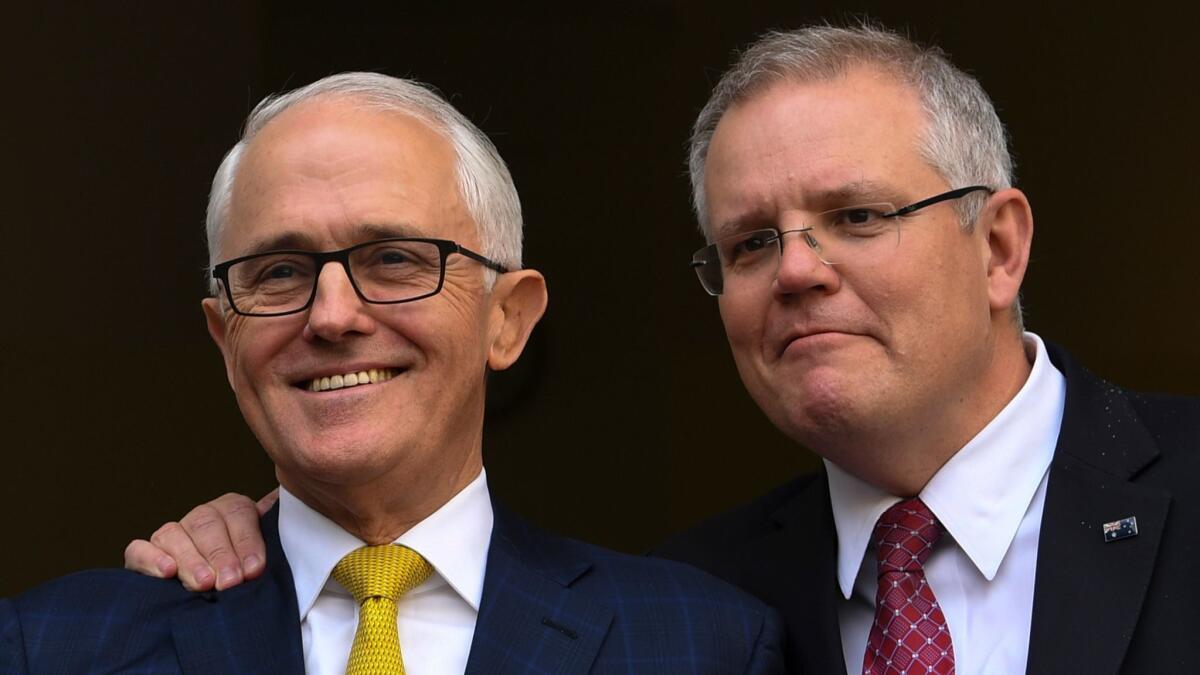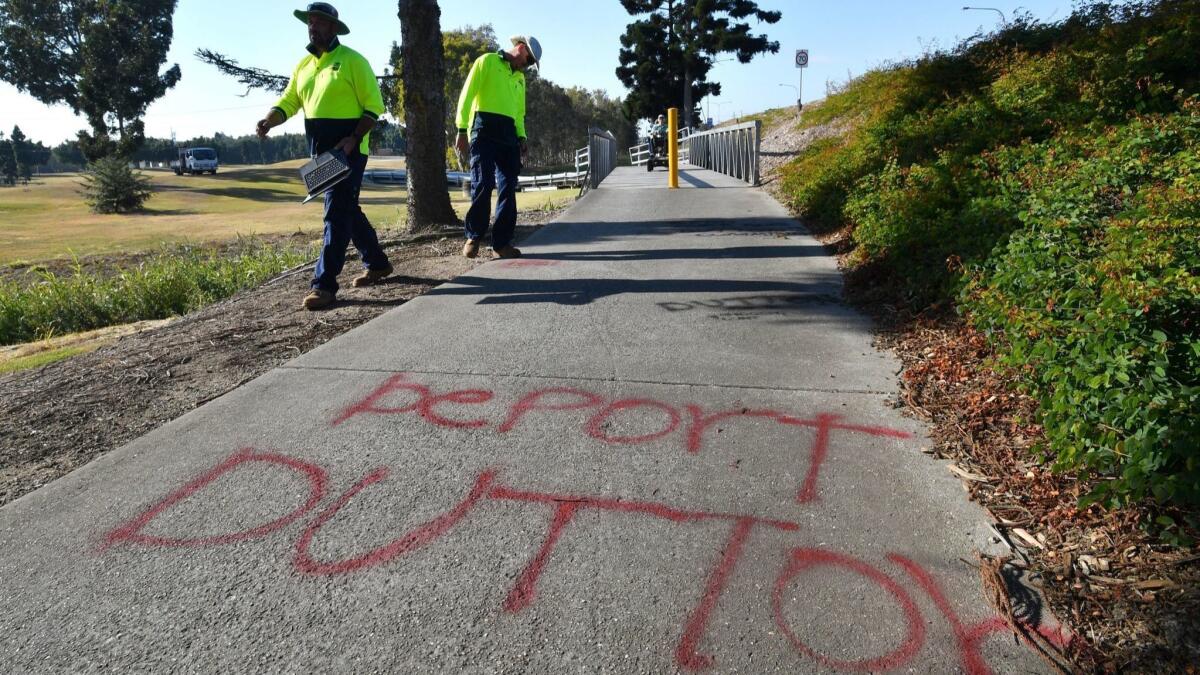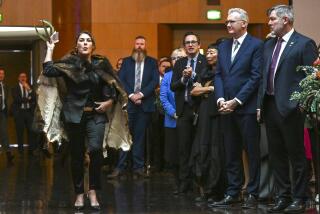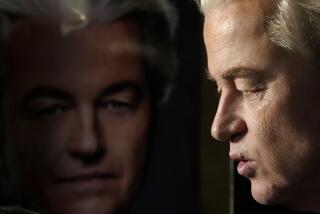One hard-line anti-refugee populist loses out in his bid to lead Australia — and another wins

- Share via
In the stunning culmination of an intraparty rivalry, Australia toppled its prime minister, Malcolm Turnbull, on Friday and selected a more conservative leader from the same party known for his tough stance on immigration and social issues.
The upheaval came after a hard-line populist, Peter Dutton, marshaled the votes to topple the more moderate Turnbull, then failed in his bid to succeed him as prime minister.
After a “spill” — or leadership vote — in the governing Liberal Party, Treasurer Scott Morrison, another figure who made his name blocking refugees from reaching Australia, was voted in as prime minister.
It was the second leadership vote in a week. Dutton lost a vote among Liberal Party lawmakers Tuesday by 13 votes but took to radio airwaves the following morning vowing to make a second attempt, destabilizing the government and Turnbull’s position.
Australian politics is marked by backstabbing and internal party coups, with ambitious ministers ready to pounce should a prime minister’s popularity flag ahead of elections. No prime minister has seen out a full term in office in more than a decade.
Turnbull did not contest a second vote Friday, lacking the numbers to win. After the vote he said Australians would be dumbstruck and appalled by the “disloyalty and deliberate insurgency” in the government.
One of his main achievements as prime minister was the legalization of same-sex marriage last year, after an overwhelming vote in favor of it in a nationwide postal plebiscite. Dutton, one of the architects of the plebiscite, believed Australians would reject marriage equality and strongly opposed a “yes” vote.

Like Dutton, the 50-year-old Morrison, a former executive on Australia’s tourism task force, is a social conservative and evangelical Christian who opposes same-sex marriage. But he had declared his loyalty to Turnbull in recent days, and that helped Morrison attract support from moderates in Friday’s leadership vote, which he won narrowly, 45-40, a margin that underscored the enduring divisions in the government. A third leadership candidate, Foreign Minister Julie Bishop, was defeated in the first round of voting.
The Sydney-born son of a policeman, Morrison quoted the Bible in his first parliamentary speech, stating that his faith gave him values of “loving kindness, justice and righteousness on Earth; for I delight in these things, declares the Lord.” That was not an aberration: His faith often informs his political speech.
Unlike Dutton, Morrison voted in favor of a 2008 apology to indigenous people for the government’s past policy of removing Aboriginal children from their families. But in 2013, he launched his party’s “Stop the Boats” policy of denying refugees arriving by sea the chance to settle in Australia, and keeping them indefinitely in camps on Papua New Guinea’s Manus Island and in the island nation of Nauru, a policy criticized by the United Nations for evading Australia’s responsibilities under the 1951 Refugee Convention.
After his election Morrison vowed to address the economy and a long-running drought.
Turnbull, a wealthy former merchant banker with a harborside mansion in Sydney, struggled to improve his party’s popularity ratings. His conservative party has trailed the centrist Labor Party in the polls, although Turnbull’s rating was higher than that of opposition Labor leader and former trade union official Bill Shorten.
Turnbull made international headlines last year when President Trump, shortly after his inauguration, angrily hung up on him, calling it the worst of his phone calls with world leaders that day.
Turnbull also recently angered the nation’s biggest trading partner, China, by delivering a clumsy comment in poor Chinese that “the Australian people have now stood up” against foreign interference in Australian politics. The remark was insulting to China because it drew on a comment attributed to Mao Tse-tung at the 1949 founding of the People’s Republic of China after a century of foreign occupation, wars, exploitation and humiliation.
As in Britain, Australian prime ministers are not elected by the population but by parliamentarians of the governing party. In the Liberal Party they can be removed at any time in a party room vote. As a result, political leaders have to worry as much about their numbers in the party room as their popularity in opinion polls.
Another Liberal Party leader, Tony Abbott, ousted Turnbull as party leader in 2009 only to see the tables turned in a party room vote in 2015. He went on to work at quietly undermining Turnbull. The Labor Party saw a similar pattern with leaders Kevin Rudd and Julia Gillard. But in 2013, under Rudd, the Labor Party introduced rules making it harder to topple a governing leader.
Dutton, 47, is a former policeman and businessman from the state of Queensland whose trademark is his aggressive rhetoric and opposition to “politically correct” people.
Rudd tweeted Thursday that Dutton should never be prime minister, given what Rudd characterized as his willingness to use dog-whistle appeals to racism. In 2008, when Rudd, then prime minister, pushed through the apology to indigenous people, Dutton abstained from the vote and refused to applaud.
In a thinly veiled reference to Dutton after the leadership vote, Turnbull said Australians rejected racism in politics.
“We are the most successful multicultural society in the world,” he said. “We must never allow the politics of race or division or of setting Australians against each other to become part of our political culture.”
Dutton succeeded Morrison as immigration and border protection minister from 2014 to 2017, taking an equally tough line in refusing refugees in the camps on Nauru and Manus access to Australia. When self-immolations, suicide attempts and other episodes of self-harm in the camps increased sharply, Dutton blamed refugee advocates rather than the “Stop the Boats” policy.
While he shrugged off the poor conditions faced by refugees in the offshore camps, Dutton vowed in March to fast-track refugee visas for white South African farmers, stating that “they need help from a civilized country,” comments that drew outrage from South Africa’s government.
Twitter: @RobynDixon_LAT
UPDATES:
6:00 p.m.: This article has been updated with additional background about Morrison.
This article was originally posted at 5:10 p.m.
More to Read
Sign up for Essential California
The most important California stories and recommendations in your inbox every morning.
You may occasionally receive promotional content from the Los Angeles Times.










